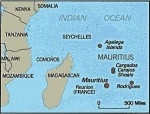One of the draws to science for many undergraduate and graduate students is the opportunity to travel to far and sometimes obscure places around the globe, in the name of research. My dissertation research keeps me local to the Chesapeake Bay region, but I have been fortunate enough to travel domestically and internationally to attend and present at conferences, as both a graduate student and also as part of my job. I haven’t been traveling much as of late due to life happening (all good things!), but I’m excited to hit the road again soon. I was recently selected to participate in the Embassy Science Fellows Program fellowship with the State Department through work. Details are starting to fall into place…and it looks like I’ll be heading to Mauritius!
Mauritius is a volcanic island nation off the coast of Southern African in the Indian Ocean, to the east of Madagascar. It is known for its beautiful turquoise waters and the world’s third largest coral reef which surrounds the island. Perhaps you have heard of Mauritius because it was the only known home of the now extinct Dodo bird! Or maybe you have heard of the country because it is headed by a female biodiversity scientist, President Dr. Ameenah Gurib-Fakim (their first female President!). Did you hear me?! There is a female scientist ruling the country! The bulk of her research focuses on deriving pharmaceuticals from native Mauritian plants: prior to becoming President, she was a Managing Director of a pharmaceutical research company, as well as a university professor.

The island is teaming with rare flora and fauna indigenous and there are breathtaking sandy white beaches and protected lagoons all around the island. Similar to other nations with borders to the sea, much of the biodiversity and ecological resources of the island are now threatened by human development, coastal erosion, climate change and the introduction of non-native species. There is particular interest by the government in protecting and conserving these natural treasures, all the while balancing sustainable population and economic growth. One of the ways the country hopes to accomplish this is by promoting environmental and oceanographic sciences in the public education curriculum. My main task during this fellowship is to lecture at the University of Maurtitus and advise the various government ministries on increasing the awareness of the importance of biodiversity and conservation at the national scale.
I am looking forward to this once-in-a-lifetime experience! It is not every day that I get the opportunity to merge my marine science background with policy in an international context such as this one. I am looking forward to also immersing myself in the culture…and getting the chance to meet with Dr. Gurib Fakim (I heard she is looking forward to meeting me- eek!). Details of my departure are still being worked out, but I will be sure to share photos and updates while on assignment. Stay tuned until then!
-Treda Grayson, PhD candidate in the Fish Ecology Lab





